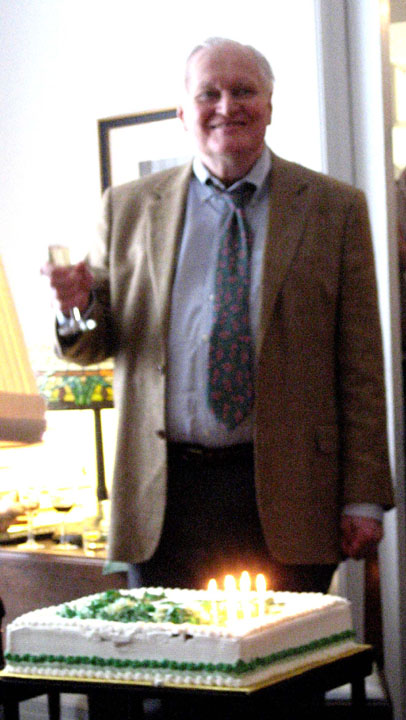
photo ©2007 Charles Bernstein
Ann Lauterbach
John Ashbery Introduction
15 September 2007
at "That Feeling of Exultation"
Bard’s celebration of Ashbery’s eightieth Birthday
When John Ashbery’s great friend and partner David Kermani and I began to talk about this weekend’s celebration, we imagined a forum of activities that would animate the myriad ways in which Ashbery’s work is connected to the other arts and artists of our time. Indeed, if you consult the on-line Ashbery Resource Center, you will find an astonishing matrix of such connections: to literature, music, visual arts, cinema, television, radio and animation, theatre, dance, opera. Scratch the surface, you will find everyone from Daffy Duck to Joseph Cornell to Elliott Carter--- the list is, literally, endless. To do this variousness justice, we would have needed not one, but ten weekends. Think of this as a beginning, a touchstone.
The title for today’s festivities was taken from one of my favorite Ashbery poems, “A Blessing in Disguise”, from Rivers and Mountains. To have a favorite Ashbery poem is a little like having a favorite strawberry, or rose, or word. But one does have favorites, based, like many favorite things, on long-term familiarity. One turns and returns to certain poems, and certain lines within those poems: “ and then I start getting this feeling of exaltation.”
This feeling of exaltation is certainly what I got when I first heard John Ashbery read, in London, in 1971. His appearance there was the culminating event in a series on contemporary French, Eastern European and American poetry I had organized as curator of literary events at the Institute of Contemporary Arts.
After his reading. I approached him with baffled enthusiasm and declared, “O Mr. Ashbery, I love clichés!” He looked at me and, with an expression of slightly bemused interest, replied, “And they love you.”
As his American English hostess, I got to hang out with him. We went shopping for a velvet jacket on Carnaby Street. I hailed him a cab after a day at the home of poet Anthony Howell, on Hampstead Heath, and I remember saying to the Cockney cabbie: “The Ritz Hotel. And take good care of him, he is America’s greatest living poet.” One night he read aloud to a small group of us in his hotel room. He had just finished the three long prose pieces that make up Three Poems. Imagine yourself a young ex-patriot aspiring poet in a sea of Sylvia Plathian intensities hearing these words:
“I thought that if I could put it all down, that would be one way. And next the thought came to me that to leave all out would be another, and truer way.
Clean washed sea
The flowers were.
These are examples of leaving out. But, forget as we will, something soon comes to stand in their place. Not the truth, perhaps, but ---yourself. It is you who made this, therefore you are true. But the truth has passed on
To divide all.”
This feeling of exaltation is what came upon those of us who heard him read his poems then, and to those who hear or read them now. Amazing, when you think of it: beginning in 1953 with a chapbook, Turandot and Other Poems and moving through twenty-five collections to his most recent, the somber and beautiful A Worldy Country. At nearly every page along the way, we have been invited to re-imagine what a poem is, to listen in a new way.
This newness shifted the ground on which a poem might be resting. Indeed, the separation of figure from ground in an Ashbery poem is all but dissolved; things seem to happen in a fluid solution, as if always on the way to or from a destination that is itself simultaneously approaching and receding. Observations, revelations, ideas, encounters, and objects course through in such a way as to suggest there is nothing to know outside of the poem. This replete, mutating experience is carried along on the most elastic yet taut syntax; and, because nothing stays in focus for long, the notion of a poem as high-resolution picture, or story, or memo to live by, gives way to the poem as a condition, a habitat, a surround.
Between the high detail of the foreground and the abstract distance of the horizon, the reader is invited in. One can take one’s stuff; it is quite roomy. It is the space, say, of a city square, an open market, a corner bodega, a hotel lobby. Here we greet each other, exchange information and opinion, but because we are on our way elsewhere, a certain civility prevails; we do not intrude, or impose. The diction is one of mild, good-natured inquiry and response; a demotic grace and graciousness prevails, invariably punctuated by mishearings, odd juxtapositions, the marvelous, sometimes sad and often funny enjambments and eruptions of actual life.
Ashbery’s work has been central to our major critical thinkers, from Harold Bloom’s track of the American sublime to Marjorie Perloff’s poetics of indeterminacy; recently, it provided the central example for Angus Fletcher’s A New Theory for American Poetry. Above all, as this weekend’s poets have so exuberantly demonstrated, John Ashbery has given seminal inspiration and nourishment, across the generations, to an extraordinary range of poetic energies.
To make poetry from the place of the commons, the middle distance, is to remind us of ourselves in relation to each other; that is, of our unique human engagement with language as a key to our various and particular reciprocities. To enter an Ashbery poem is to find oneself oddly consoled, at ease, within the deepest boundaries of reception. It is the space of an ideal real: everything is noticed, everyone is included:
“I prefer you in the plural, I want you,
You must come
to me, all golden and pale
Like the dew and the air.
And then I start getting this feeling
of exaltation.”
Ladies and gentlemen.
Please welcome
John Ashbery
link | 09-16-07